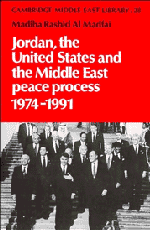Book contents
- Frontmatter
- Contents
- Foreword by William B. Quandt
- Acknowledgements
- Prologue
- 1 Introduction
- 2 Kissinger's legacy and imprint on the Middle East
- Part I Jordan in the Carter Middle East policy
- Part II Jordan in the Reagan Middle East policy
- Part III US, Jordan and Arab approaches to peace
- Appendices
- A Comparison of Middle East peace proposals
- B Jordan–US exchange of questions and answers on the Camp David Accords, September 1978
- C US assistance to Jordan 1975–1989
- D Arab assistance to Jordan paid in accordance with the 1978 Baghdad Summit Conference and 1980 Amman Arab Summit
- E Peres–Hussain Agreement (The London Document), 11 April 1987
- F Shamir's Four-point plan, April 1989
- G Baker's Five-point plan, December 1989
- H Invitation to Madrid Peace Conference, 18 October 1991
- I Letter of Assurances to the Palestinians, 18 October 1991
- Notes
- Select bibliography
- Index
- Cambridge Middle East Library
F - Shamir's Four-point plan, April 1989
Published online by Cambridge University Press: 25 February 2010
- Frontmatter
- Contents
- Foreword by William B. Quandt
- Acknowledgements
- Prologue
- 1 Introduction
- 2 Kissinger's legacy and imprint on the Middle East
- Part I Jordan in the Carter Middle East policy
- Part II Jordan in the Reagan Middle East policy
- Part III US, Jordan and Arab approaches to peace
- Appendices
- A Comparison of Middle East peace proposals
- B Jordan–US exchange of questions and answers on the Camp David Accords, September 1978
- C US assistance to Jordan 1975–1989
- D Arab assistance to Jordan paid in accordance with the 1978 Baghdad Summit Conference and 1980 Amman Arab Summit
- E Peres–Hussain Agreement (The London Document), 11 April 1987
- F Shamir's Four-point plan, April 1989
- G Baker's Five-point plan, December 1989
- H Invitation to Madrid Peace Conference, 18 October 1991
- I Letter of Assurances to the Palestinians, 18 October 1991
- Notes
- Select bibliography
- Index
- Cambridge Middle East Library
Summary
Text of the official Foreign Ministry formulation of the Prime Minister's proposals
The four-point plan
(1) The Camp David partners – reconfirmation of the commitment to peace
Ten years ago, the peace treaty between Israel and Egypt was concluded on the basis of the Camp David accords. When the accords were signed, it was expected that more Arab countries would shortly join the circle of peace. This expectation was not realized. The strength of Israeli–Egyptian relations and the co-operation between the three partners to the accords have a decisive influence on the chances for Middle East peace, and the Israeli–Egyptian treaty is the cornerstone to the building of peace in the region.
Therefore, the Prime Minister has called on the three countries whose leaders affixed their signatures to the Camp David accords, the USA, Egypt and Israel, to renew, 10 years later, their commitment to the agreements and to peace.
(2) The Arab countries – from a state of war to a process of peace The Prime Minister urged the USA and Egypt to call on the other Arab countries to desist from hostility towards Israel and to replace belligerency and boycott with negotiation and co-operation. Of all the Arab countries, only Egypt has recognized Israel and its right to exist. Many of these states actively participated in wars against Israel by direct involvement or indirect assistance. To this day, the Arab countries are partners in an economic boycott against Israel, refuse to recognize it and refuse to establish diplomatic relations with it.
- Type
- Chapter
- Information
- Publisher: Cambridge University PressPrint publication year: 1993

